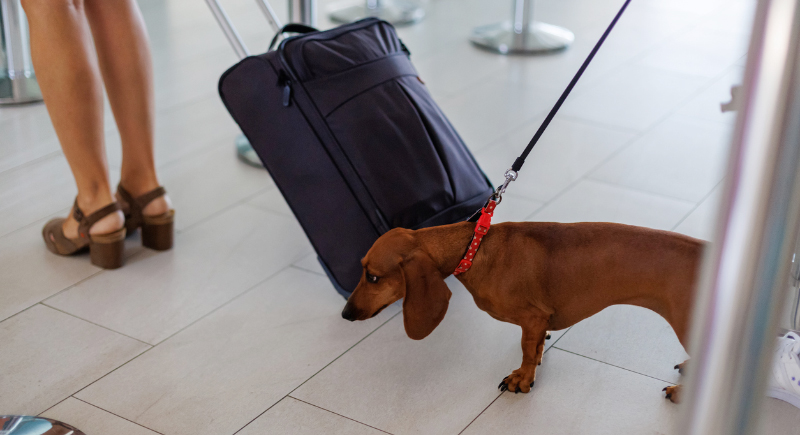So, According to the EU, Your Fur Baby Is Just… Luggage Now?
Flying with a pet already involves a checklist of rules, health documents, and carrier requirements. The stress multiplies once the animal is out of sight in the lower deck, which is why pet parents expect strong protection if something goes wrong during air travel.
A recent decision by the European Court of Justice challenged that expectation and sparked different reactions across Europe.
How One Missing Dog Triggered a Major Legal Debate

Image via Wikimedia Commons/Alex Proimos
In 2019, a Spanish passenger named Felicísima checked in her dog, Mona, for an Iberia Airlines flight at Buenos Aires airport. Mona had to be checked as cargo because of her size, and she was placed in a secure crate before airport workers moved her toward the aircraft. During that process, the canine escaped the crate, ran across the tarmac, and could not be caught. She never appeared again, even after searches and social media campaigns.
The loss led to a six-year court battle in which the passenger sought €5,000 for emotional harm. Iberia accepted responsibility for the disappearance but rejected the requested amount, and the case reached Europe’s highest court for clarification on airline liability. The ruling did not answer the question of blame but focused instead on how the law classifies animals during international air transport.
Why The Court Classified Pets as Baggage
The court’s reasoning came down to technical language. Under the Montreal Convention, which regulates international air travel, only humans qualify as “passengers.” Everything else—regardless of value or sentiment—falls under “baggage.” Since the treaty doesn’t recognize a separate category for animals, the European Court of Justice ruled that pets transported in the plane’s hold legally count as baggage.
This interpretation affected how much compensation the owner could claim. The court ruled that the airline’s liability was limited to the standard baggage rate, awarding €1,578.82 instead of the €5,000 sought. While the decision doesn’t reflect the emotional weight of losing a pet, it now stands as a reference for future disputes over animals lost during international flights.
The Role of Special Declarations in Compensation

Image via iStockphoto/Aerogondo
Under the Montreal Convention, travelers may request higher payouts for checked items through a “special declaration of interest in delivery,” which requires a fee. This declaration increases the carrier’s liability if the item is lost. Mona’s owner did not file one, so the court applied the standard limit. The court ruling highlighted a practical problem: many passengers are unaware of the process, and lawyers in the case argued that airlines rarely accept such notices for pets anyway.
Without that step, reimbursements remain capped even in situations involving irreplaceable animals. The ruling did not order airlines to change their procedures or create a clearer path for declarations. Instead, it reinforced that current liability rules apply as is. Pet guardians now face a system that recognizes personal loss in conversation, yet handles financial liability through a structure designed for suitcases and cargo stored below the cabin.